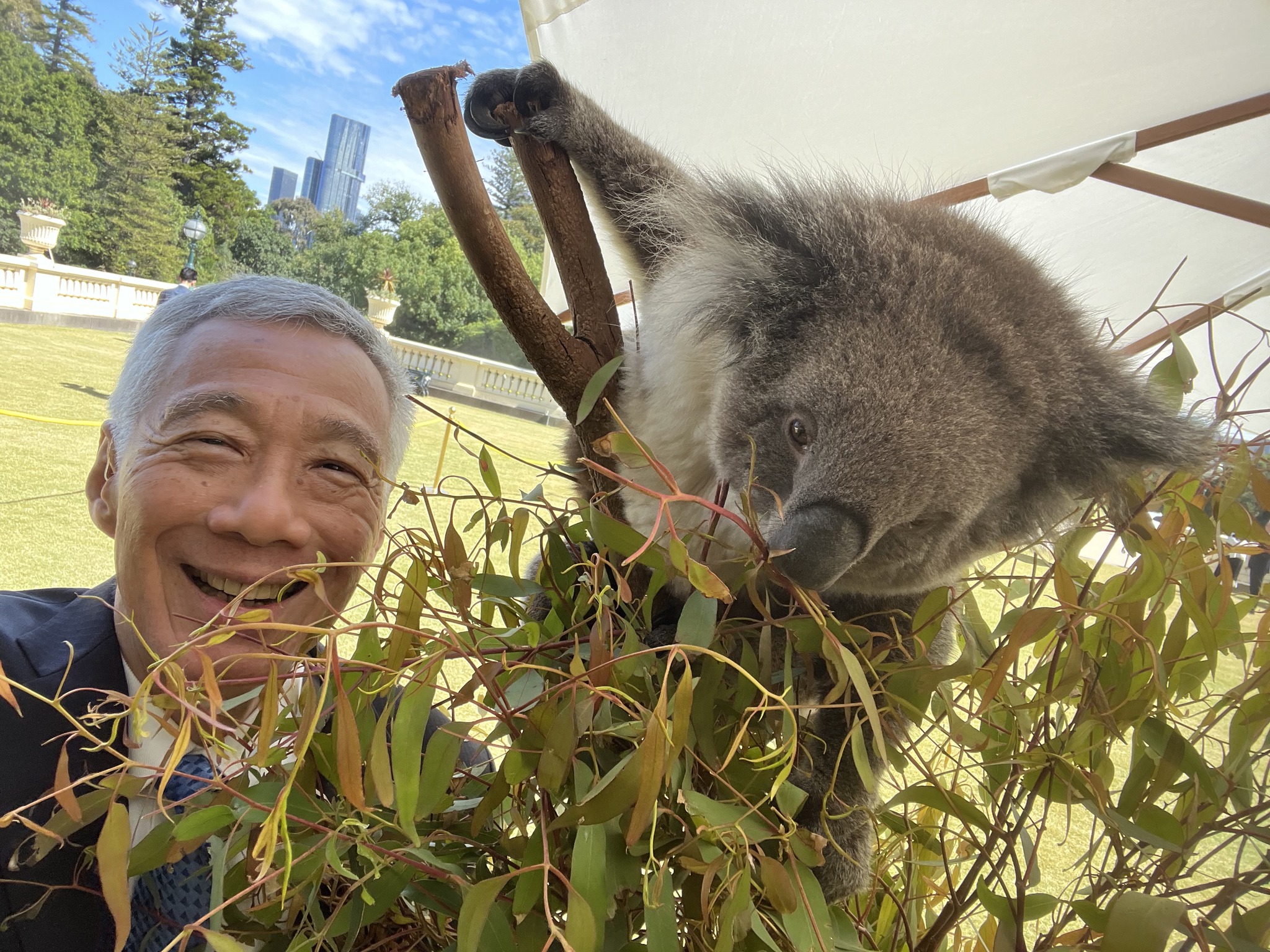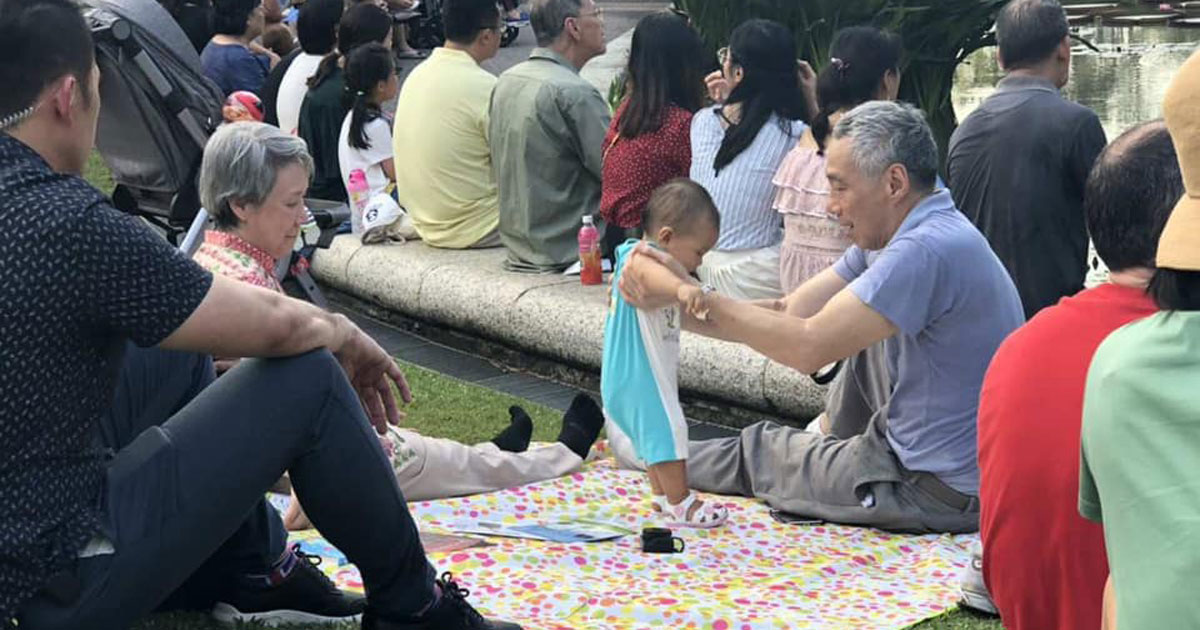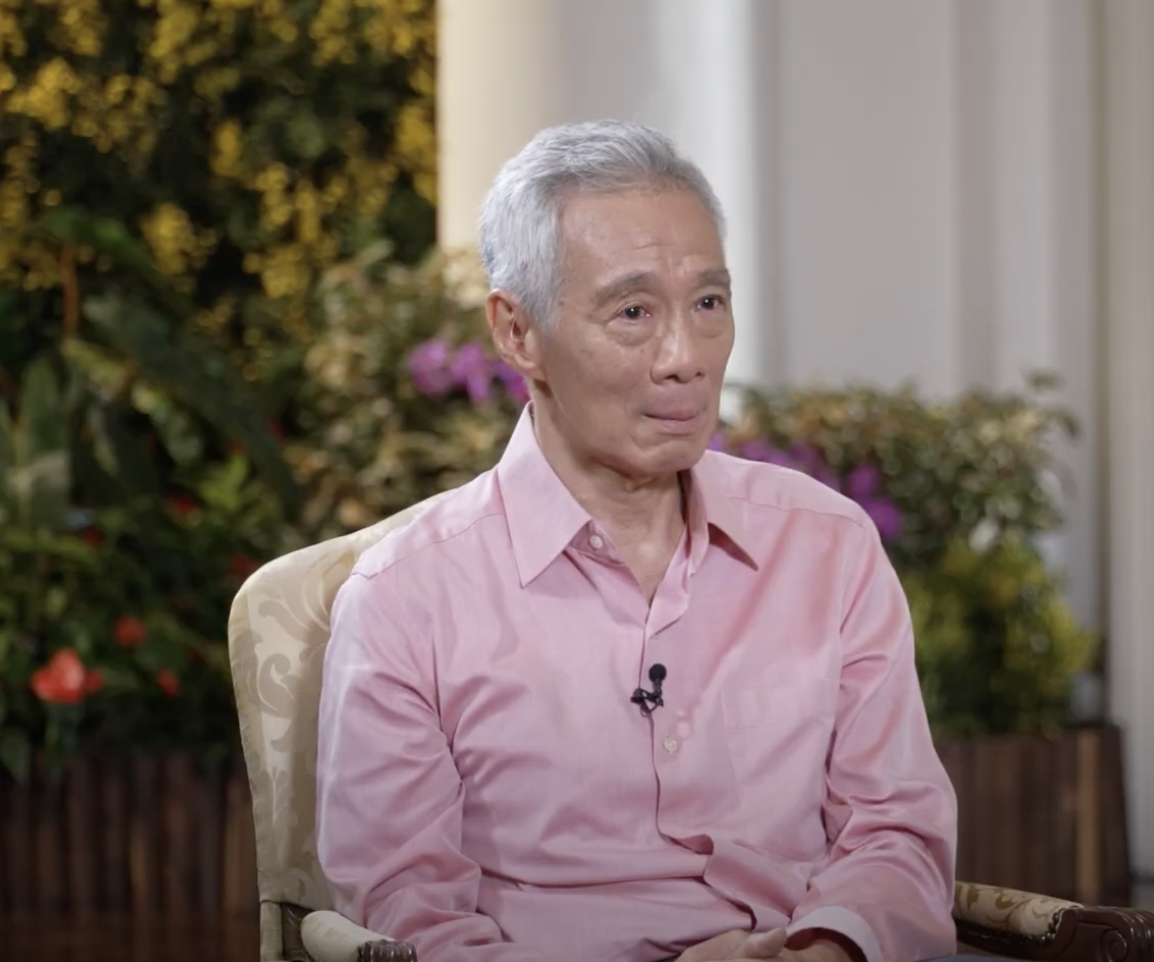When he sits down for his last interview in The Istana as Singapore's Prime Minister, Lee Hsien Loong, 72, is fresh-faced and effervescent.
Dressed in his trademark pink, he jokes with his interviewers — even pokes fun at himself.
"Cheryl, who’s the makeup lady, has decided my hair needs to look a bit taller," he quips, when someone comments on his neatly-cropped hairdo.
"Because there’s less of it to make taller."
For the next three hours or so on Apr. 26 — and again in Mandarin, several days later — Lee discusses everything from his jalan-jalan photos on Facebook to what it means to be a Singaporean.
 Photo from Lee Hsien Loong/Facebook
Photo from Lee Hsien Loong/Facebook
End of an era
In November 2023, the statesman of 20 years made a long-anticipated announcement: he would hand over the reins to his successor, Deputy Prime Minister Lawrence Wong, before the People’s Action Party’s 70th birthday.
After 20 years in service, it’s hard to imagine a life untethered to the country’s premiership. But when the subject of his handover is surfaced, PM Lee tackles it with conviction, saying the next generation of leaders are "ready" to take up the mantle.
“There is no need to wait any longer — in fact, it’s been long overdue,” he says.
“We have been preparing this for a very long time.”
The succession has indeed been in the works for a while.
In Nov. 2018, Deputy Prime Minister Heng Swee Keat was tipped to lead the 4G team after he was appointed the 1st Assistant Secretary-General of the PAP, effectively becoming the prime minister-in-waiting.
But after the Covid-19 pandemic hit, the succession plan had to be delayed as Heng decided to "step aside" in 2021.
He explained that his age and health meant he would have "too short of a runway" should he take the reins after the pandemic was over.
 Image via PM Lee's Instagram
Image via PM Lee's Instagram
The 4G leadership position was later taken up by Wong.
Fast-forward to this April, when PM Lee finally announced a date for the long-awaited handover: May 15, 2024.
It has been 20 years since Singapore’s previous leadership transition. Given this, PM Lee expects the new team to be "probed" in terms of foreign policy — hopefully gently, but maybe not.
"People will want to see how the new leaders are, what their policy is, and what their personality is," he explains.
"His standing, his strength and support at home, and his ability to engage… and to be somebody to take seriously."
As such, Singapore must be ready to respond.
"Not in a harsh way," PM Lee clarifies, "but to quietly stand our ground and let people know that we may have had a changing of the guard".
"But the new guards are prepared, and the old guards are still giving hopefully useful views to the new team on how to do [their work].”
 Image via PM Lee's Instagram
Image via PM Lee's Instagram
PM Lee doesn’t paint a perfect picture of the incoming PM. Instead, he gives an honest assessment of fortes and faults, and being human.
“Every leader has his own working style, has his individual strengths and weaknesses. After a period, his team has come to understand this, as have Singaporeans,” he says.
"I hope Singaporeans will, after a period, understand what the team can do for them."
The Singapore identity
With 20 years at the country’s helm to reflect on, PM Lee ponders and dissects, taking his time with each question thoughtfully.
But he always comes back to Singapore.
He talks about the Singaporean identity. Singapore has changed over the past two decades — more social media influence, more travel, more prosperity.
 Image from National Archives Singapore
Image from National Archives Singapore
But it's also grown stronger as the country soldiers on, tackling crises like Covid-19 and issues like 377A.
The country has come a long way. But that doesn't mean there's no longer a need for guidance in the leadership, he explains.
“To say after this, we can fly solo — the government does not need to watch, can take [their] hands off the steering wheel or the controls, and [the country] will look after itself — I do not think so. Never,” he says.
Sensitive issues remain sensitive, and there are always more things to be broached — discussions which the government must set the tone for.
One example: immigration.
"When you bring in foreigners, in many ways you enrich [the Singaporean sense of identity]. They bring talent, they bring experience, they bring a different perspective on things," he says.
"But at the same time, you dilute that, at least temporarily, because they do not have the same background. You can come from China, but you are not the Singaporean Chinese. You can come from India, but you are not the Singaporean Indian.
And there is a difference between a Singaporean Chinese and a Chinese-Chinese, and a Singaporean Indian and an Indian-Indian."
As a small, open nation, outside influences will trickle into Singapore as they always have. Some more persuasive than others; he cites Western "wokeness" as an example.
But when movements "sweep the world", there is a need to look at things with caution, and to consider its place in Singapore.
“We are all part of one global humanity, and yet we are a Singapore nation," PM Lee explains.
"[We] will always be both of these. And I want to keep this Singapore nation cohesive, united. Open, but not dissolved and just melted away."
To the past, and to the future
Like every great project, Singapore remains unfinished and evolving. Even 20 years, or a lifetime, is not enough to troubleshoot a nation’s worth of problems.
All the same, PM Lee looks towards the transition with anticipation. He lists his plans: to pick up photography, AI, spend time with the grandkids.
 At the Botanic Gardens in 2019 with his grandchild. Photo from Sunny Xia/Facebook
At the Botanic Gardens in 2019 with his grandchild. Photo from Sunny Xia/Facebook
“I have no regrets,” he says.
“My team and Singaporeans have both done a lot, which is why Singapore is a shining red dot today.”
Towards the end of the interview in Mandarin, the elder statesman takes a moment to address Singaporeans.
He starts with the ones who’ve grown alongside him.
“To the senior generation, thank you for your sacrifice, your hard work, and your contributions that have made Singapore what it is today,” he says.
To the middle-aged, PM Lee thanks them for bringing Singapore to greater heights and overcoming many challenges along the way.
The road ahead might warrant some getting used to, he cautions.
“But don’t worry, we will walk with you.”
His voice wavers and he dips his head, pausing for a moment to compose himself.
 Screenshot from PMO
Screenshot from PMO
It’s almost a minute before he’s ready to go on. This time, he turns to the youth.
To the generation whose “future holds infinite possibilities”, PM Lee says to “take advantage” of the more promising cards they’ve been dealt.
“Bring Singapore into the new world with you,” he tells them.
“Make Singapore a completely different place.”
Moving on
Upon stepping down, PM Lee will continue serving in the Cabinet as Senior Minister, following in the footsteps of his father as well as his predecessor.
He’s also mentioned on several occasions that he intends to be at the new prime minister’s disposal.
“I will remain in government, and continue serving as MP for Ang Mo Kio GRC,” he wrote in a May 7 Facebook post.
“I will do whatever I can to help PM Lawrence and his team succeed.”
The conversation winds back to the septuagenarian himself. To how he feels about releasing his grip on the reins.
He doesn’t miss a beat when he replies: “Calm.”
“I’ve done all I should do,” he goes on. "Being able to have a smooth handover isn’t easy. Many countries aren’t able to plan for it or if they do, are unable to execute it."
This is how it should be when one accepts a duty, he explains.
“You should also have the courage to let go of it when the time is right.”
The interview ends. There’s a flurry of activity from the crew as they crowd around the man, but he's noticeably more subdued than he was at the start — a little weary even. But content.
He sits quietly as the mics come off and the reporters trickle out. For a second, it's easy to forget that he's the prime minister of Singapore.
It’s been a long few hours, and a longer few years.
But whatever happens next — it’s been a good run.
 Image from National Archives Singapore
Image from National Archives Singapore
Related Stories
Top images via MCI, Mediacorp, National Archives Singapore and PM Lee's Instagram
If you like what you read, follow us on Facebook, Instagram, Twitter and Telegram to get the latest updates.



